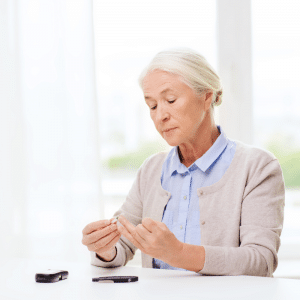7 Simple Ways to Help Your Aging Loved One with Diabetes
Let’s talk diabetes. For many, that is a big scary word that most people never want to hear from their doctor. Usually when a diagnosis like this comes, it means that there has to be some dramatic changes in our lives. Most people do not like change, especially people who have gone through many seasons of life. If you have an aging loved one who was recently diagnosed with diabetes, you might be feeling overwhelmed about how to best care for them. Especially if they are living alone or in an assisted living home. How can you help them when you aren’t constantly there to check up on them? Here are 7 ways that you can:
- Open up communication with the staff of the assisted living home and your loved one’s doctor. When you keep communication lines open, it will make you feel reassured that your loved one is getting well looked after, even when you aren’t there.
- Go along to their appointments and take notes about anything that the doctor says. Research the disease beforehand, that way you know which questions to ask. If you can’t make it to an appointment find someone that they can trust to take them instead.
- Make sure to talk to the nurses at the assisted living home about your loved one’s medication regimen, any diet changes that are needed, and about the level of exercise that the doctor says your loved one should be getting.
- Encourage your aging family member in any changes that need to be made to help improve their overall health. This could be as simple as learning how to use a daily glucose test and showing them how to do it. Or helping them understand which medications they need to take and when.
- Ask their doctor about which exercise regimen is good for them and either drive them to their exercise classes or PARTICIPATE in it with them. Exercise will help lower stress levels and in turn bring down blood sugar levels.
- Another way to help is to get creative with them in the kitchen. With diabetes, doctors usually recommend that they have a good diet full of a variety of vegetables and proteins. Sugary foods and lots of carbohydrates can really hurt a diabetic. This can be a hard one to change, especially if your loved one has spent most of their lives eating processed food. Share the journey of getting healthier with them so they don’t feel like they are all alone in it. Make new recipes together or help them modify some of their old favorites to make them healthier. Another way to help with food is to help stock their kitchen with good healthy snack choices for them to eat throughout the day.
- For diabetics having wounds or blisters can really be a cause for concern, especially on the feet. Because their nerve endings are damaged it could be hard for them notice if there is any damage to their feet. If it goes on for a while without treatment, this could lead to serious problems like infection, gangrene or amputations. So please teach your loved one how to regularly check their feet. Also encourage them to wear shoes or slippers that will prevent them from stubbing their toes or falling.
Overall, just try to be there for your loved one. They might not show you that they appreciate it, in fact they might show you the opposite. But try to keep encouraging them that you are only trying to help them keep their independence longer so that they can live the rest of their lives to the fullest.

